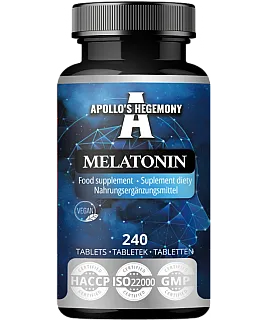Melatonin and neurodegenerative diseases - what are the relationships?

Nervous system diseases inspire a lot of fear. After all, no one wants to lose control of their body or mind. Therefore, it is worth ensuring that our daily life is conducive to neuroprotective measures, so that the body can properly protect the nervous system from threats. And this is a task to be implemented as early in life as possible. We approach neuroprotection like insurance - we implement measures even when we do not yet suspect risks. One of the key elements for neuroprotection is healthy sleep, and the melatonin responsible for it. The protective effect of melatonin against neurodegenerative diseases has been described in many scientific publications, an important aspect of this hormone. From this article you will learn how melatonin affects the protection of the brain from destruction. Read to the end!
- Melatonin has neuroprotective effects due to antioxidant activity
- Research findings
- Dangers of melatonin deficiency
- Summary
Melatonin has neuroprotective effects due to antioxidant activity
Melatonin 'sneuroprotective effects are largely due to its strong antioxidant properties. Free radicals in excess can pathologically damage many structures present in the brain, including proteins, lipids, DNA, etc. Melatonin prevents this in several ways, acting directly on free radicals, as well as stimulating our endogenous antioxidants to work with greater efficiency. Optimal melatonin production is one of the factors that keep oxidative stress within a healthy framework.
Thanks to its antioxidant and neuroprotective properties, melatonin is being touted for its therapeutic potential in neurodegenerative disorders such as Alzheimer's disease, Parkinson's disease, Huntington's disease and amyotrophic lateral sclerosis.
Melatonin has also been shown to have anti-inflammatory effects. Melatonin reduces tissue destruction during inflammatory reactions in a number of ways. We know from studies that it reduces the release of various pro-inflammatory cytokines, for example, interleukins and TNF-alpha.
Research findings
There have been many studies with melatonin in the context of brain protection, especially preclinical ones on animals, but not only. Many of these experiments have looked at the effects on stroke.
Administration of melatonin after experimental stroke in animals reduces infarct volume, which could be observed in both gray and white matter. Melatonin reduced the inflammatory response, brain edema formation and blood-brain barrier permeability.
In another study, it was noted that melatonin improved neuronal survival and enhanced neurogenesis, even when applied the day after a stroke. In addition, both motor and behavioral improvements were shown after melatonin administration.
There is also quite a bit of information in the literature about the effect of the efficiency of diurnal rhythms (and thus the rhythm of melatonin secretion) of pregnant mothers on the neurological development of fetuses. Melatonin easily crosses not only the blood-brain barrier, but also the placental barrier. Mothers also pass melatonin to their babies with their milk, and the concentration of melatonin in maternal milk is dependent on the time of day at which that milk is produced. Thus, breast milk feeding may better influence a child's nighttime sleep and provide an additional neuroprotective factor.
The neuroprotective effect of melatonin on babies' brains is the subject of research aimed at finding an effective means of reducing the risk of neurological disorders in premature infants. Melatonin appears to be an attractive candidate due to its matching profile of mechanisms of action and excellent safety profile.
Dangers of melatonin deficiency
Abnormalities in melatonin physiology associated with sleep disorders, particularly sleep deficiency or poor quality, threaten the integrity of the brain, and more specifically the integrity of the hippocampus, leading to cognitive dysfunction and contributing to the development of mood disorders.
Too little melatonin production can result in prolonged sleep duration and spoil the ratio of different sleep phases (nREM and REM). This results in poorer recovery and impaired quality of life - increased daytime sleepiness and fatigue, impaired cognitive function, more stress, etc.
The elderly are particularly vulnerable to melatonin deficiency, as is the development of neurodegenerative diseases. Average melatonin levels decrease with age, which clearly correlates with an increase in the risk of sleep disorders. One can also see a correlation precisely between the level of available melatonin and the risk of neurodegeneration. There are many benefits to supplementing melatonin levels in seniors, which include both better sleep and better brain protection. In many cases, supplementation with even a small amount of melatonin can be very useful.
Summary
Healthy sleep and the accompanying melatonin are extremely important neuroprotective factors. Every health-conscious person needs to take care of them so that they are not lacking. Failure to do so increases the risk of many health disorders, including neurodegenerative disorders and general impairment of brain function.
Sources:
 ⮜ Previous article
⮜ Previous article
What dosage of Ashwagandha is most effective?
 Next article ⮞
Next article ⮞


